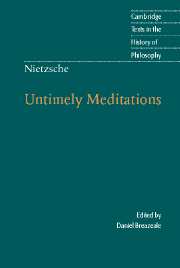Book contents
- Frontmatter
- Contents
- Introduction
- Chronology
- Further reading
- Note on the text
- Untimely Meditations
- David Strauss, the Confessor and the Writer
- On the Uses and Disadvantages of History for Life
- Schopenhauer as Educator
- Richard Wagner in Bayreuth
- Glossary of names
- Notes
- Index
- Cambridge texts in the history of philosophy
David Strauss, the Confessor and the Writer
Published online by Cambridge University Press: 05 June 2012
- Frontmatter
- Contents
- Introduction
- Chronology
- Further reading
- Note on the text
- Untimely Meditations
- David Strauss, the Confessor and the Writer
- On the Uses and Disadvantages of History for Life
- Schopenhauer as Educator
- Richard Wagner in Bayreuth
- Glossary of names
- Notes
- Index
- Cambridge texts in the history of philosophy
Summary
Public opinion in Germany seems almost to forbid discussion of the evil and perilous consequences of a war, and especially of one that has ended victoriously: there is thus all the more ready an ear for those writers who know no weightier authority than this public opinion and who therefore vie with one another in lauding a war and in seeking out the mighty influence it has exerted on morality, culture and art. This notwithstanding, it has to be said that a great victory is a great danger. Human nature finds it harder to endure a victory than a defeat; indeed, it seems to be easier to achieve a victory than to endure it in such a way that it does not in fact turn into a defeat. Of all the evil consequences, however, which have followed the recent war with France perhaps the worst is a widespread, indeed universal, error: the error, committed by public opinion and by all who express their opinions publicly, that German culture too was victorious in that struggle and must therefore now be loaded with garlands appropriate to such an extraordinary achievement. This delusion is in the highest degree destructive: not because it is a delusion – for there exist very salutary and productive errors – but because it is capable of turning our victory into a defeat: into the defeat, if not the extirpation, of the German spirit for the benefit of the ‘German Reich’.
- Type
- Chapter
- Information
- Nietzsche: Untimely Meditations , pp. 1 - 56Publisher: Cambridge University PressPrint publication year: 1997
- 4
- Cited by

